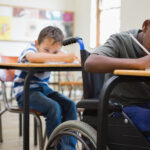Autism Spectrum Disorder
Autism Spectrum Disorder
Learn about what Autism is with this video below that Dr. Meg Stone-Heaberlin, a licensed clinical psychologist at Cincinnati Children’s Hospital helped create.
Behavior
Behavior
An Early Childcare Provider’s Guide to Managing Challenging Behaviors, with intervention strategies and positive behavioral supports
Education
This is a list of our currently developed materials. This does not include the full spectrum of the knowledge and expertise that we share.
Questions to ask myself when considering a new school
Questions to ask myself before an IEP meeting
DDBP Educational Support
Charting the LifeCourse Principles
Charting the LifeCourse for Families
Power of Charting the LifeCourse in Planning in School
Charting the LifeCourse and the IEP Process
Charting the LifeCourse IEP and Belonging
Parent Training and Information Org
Emergency Preparedness
Disaster Preparedness Videos
These videos discuss how to prepare for disasters, how to create an emergency plan, and features a self-advocate and his caregiver who discuss the planning process in the event of an emergency situation.
Emergency Preparedness print/web resources
These resources were designed to assist individuals with disabilities in preparing for disasters. Regional and FEMA (government) resources are also included in all three brochures.
Creating an Emergency Preparedness Plan with Your Caregiver: Focuses on the importance of discussing emergency planning between individuals and their caregivers. Sheltering in Place, Community Sheltering and Evacuating are all covered.
Disaster Preparedness for People with Disabilities: Impact Areas of Disasters. Discusses 10 areas of an individual’s life that would be affected in the event of an emergency. Information about receiving alerts and a review of Smart 911 is also included.
Creating Your Emergency Kit: Provides individuals with information regarding the importance of having an emergency kit. A list of items to include in a kit and a checklist of what to do to be prepared is also provided.
Preparedness in the Event of an Emergency – for specific groups (Print/Web Resources)
Know Your Rights When Preparing for an Emergency, Resource for Individuals Who Have Paralysis
A Resource for Medical Care Providers Serving Individuals with Paralysis
A Resource for First Responders and Emergency Management, Specific to Interaction with Individuals with Paralysis
Emergency Responders and How they Interact with People with Disabilities (Videos)
Many individuals with disabilities and their caregivers have questions for Emergency Responders about what to do or what happens in case of an emergency and/or rescue situation. The opposite is also true for Emergency Responders and how to best interact with caregivers or individuals who have disabilities they may or may not be familiar with or trained to assist. The following animated videos are an attempt at recreating the “discussion” between these two groups. In the first video, emergency responders answer questions from individuals with disabilities and caregivers. In the second video, individuals with disabilities and caregivers answer questions from emergency responders.
Emergency Responders and How they Interact with People with Disabilities – First Responders answer questions from Individuals with disabilities
Emergency Responders and How they Interact with People with Disabilities – Individuals with disabilities answer questions from First Responders
Family Support
We provide a limited number of one-on-one family support session on issues related to developmental disabilities. Please contact ddbpfamilysupport@cchmc.org or contact us using this form
Self-Care
Ohio Family to Family (F2F)
Ohio Parent to Parent (P2P)
UCCEDD Intake Form
DDBP Family Support
Family Navigation
Health Equity
Healthcare Discrimination and Inequities Facing People with Disabilities: A Gap Analysis
Center for Dignity in Healthcare for People with Disabilities
Ohio Disability and Health Partnership (ODHP)
To Go Bag Checklist
Health Profiles
Interactive Maps of Service Providers in the Cincinnati, OH Region
Services for Children and Adolescents with Developmental Disabilities
These resources were created by the DDBP Social Work Team. For more information, please contact DDBP_Social_Work@cchmc.org or call 513-803-7949.
Mental Health/Behavior Therapy/Psychology Evaluation Services
This is an interactive map of mental health providers in the community. DDBP social workers have been in contact with all of these providers and have been able to obtain information about the agency and providers. Once in the map, please put your address in the “Go to” box. Zoom out (minus button) until you begin to see red and blue markers.
Applied Behavioral Analysis (ABA) Services
This is an interactive map of ABA providers in the community. DDBP social workers have been in contact with the agencies and able to obtain additional information on the programs. Once in the map, please put your address in the “Go to” box. Zoom out (minus button) until you begin to see red and blue markers.
Allied Health Services
This is an interactive map of allied health providers (Occupational Therapy, Physical Therapy and Speech Therapy) in the community. DDBP social workers have been in contact with the agencies and able to obtain additional information on the programs. Once in the map, please put your address in the “Go to” box. Zoom out (minus button) until you begin to see red and blue markers.
Law Enforcement
A Guide to Interacting with Police
People with intellectual, cognitive or developmental disabilities get involved as both victims and suspects/offenders with law enforcement and with the criminal justice system. The police are ready to help in many different ways to help us feel safe.
This guide provides tips on how to interact with law enforcement.
Mental Health
How to shop for mental health services
Nursing Care
Nursing Guide
This Nursing Guide provides an overview of the options available in Ohio for those seeking home care nursing services.
“Delegating Nursing Roles and Responsibilities: A Guide for Families & People Who Have Complicated Medical Needs”
Families and People Who Have Complicated Medical Needs have options to consider in getting their home care needs met. Sometimes nursing tasks are needed but nurses are not always available or necessary to perform tasks. It is important that Ohioans understand the option of using Delegated Nursing when deciding how to get their care needs met. Delegated Nursing is a service option that allows unlicensed direct support professionals to complete tasks that would normally be completed by a nurse. The Ohio Nursing Collaborative created this guide that provide explanations of the roles and responsibilities of all parties involved when choosing to use Delegated Nursing.
Parenting and Disability
Cicadas Social Narrative
Cicadas Social Narrative talks about what to expect with the cicadas and how to deal with them.
“A Celebration of Family: Stories of Parents with Disabilities” Book
A new book being published in Louisville, Kentucky, by the Avocado Press and the Center for Accessible Living contains the stories of thirty families, where one or both parents have disabilities. In enabling these parents to tell their stories, “A Celebration of Family: Stories of Parents with Disabilities” illustrates the infinite variety of the American family.
“So You are Going to Have a Baby: A Guide for Women with Developmental Disabilities”
“Providing Prenatal Care for Women with Developmental Disabilities”
Plain Language Resources
From the AUCD UCEDD Resource Center
Policy & Advocacy
Comment submitted to Senate Committee to expand access to quality home and community-based services, March 2022
School Board Advocacy Toolkit
Research Publications
Assessing and Improving Disability Services: Lessons from Lived Experience
A Profile of People with Intellectual and Developmental Disabilities in Ohio
Information for this report was compiled from a variety of recent state and national reports, state and national data dashboards, state public use data sets, and peer-reviewed journal articles to provide a snapshot of the lives of Ohioans with disabilities across the lifespan.
Faculty Research 2021/2022
Rubinstein-Taybi Syndrome Resources
RTS Videos
We have developed ten video modules on RTS. Nine of the modules focus on medical subspecialty care for patients with RTS and one is dedicated to families’ experiences of living a good life with RTS in their homes, schools and communities. We hope these videos will contribute to increase understanding and optimal treatment of individuals with RTS. We appreciate the time, knowledge and expertise that these medical professionals and families put into making these videos with us. All videos can be found below.
RTS Booklet
Physician Factsheets
Sex and Disability
Sex and Disability
Our Associate Director, Kara Ayers, contributed to this USA Today article about Sex and Disability.
Supported Decision Making
Supporting Youth and Young Adults in Adult Decision-Making: What are our Options?
This session examines the options available for young adults and their families after turning 18 years of age and the differences between supported decision-making, power of attorney and guardianship.
Guardianship and Alternatives Powerpoint Presentation
Handout – PRACTICAL Tool Excerpt
Decision-Making Checklist – Stoplight Checklist
ODM Application Signature Authorized Representation Clarification
Safe Supported Decisions Across the Lifespan Resource Sheet
Estate Planning for Ohioans with Disabilities and Their Loved Ones
Supported Decision Making and Guardianship
Supported Decision-Making Network of Ohio
Telehealth
Telehealth
Telecommunication, including telehealth has become much more common in the midst of COVID. We have developed some tools related to telehealth titled, “Get Ready for Your Telehealth Appointment: Essentials for a Family-Centered Experience”. You can find a webinar in English and Spanish, and a factsheet in English, Spanish and Somali below.
Webinar In English
Webinar In Spanish
Telehealth Fact Sheets
Transition
Transition planning is helping students with disabilities and their families think about their life after high school, including the transition of medical care, financial transition and more. The process helps students identify long-range goals and teaching students how to gain the skills and connections they need to achieve these goals. Transition planning formally begins when a student turns 14 years old, but it is recommended to begin this process early in childhood.
Community Life Guide
Being Safe in the Community and Online – June 7, 2021
In this session attendees will learn about being safe online: how to deal with online friendships, dating and other interactions on social media. Speakers will also discuss proactive strategies to stay safe in the community, prepare for interacting with strangers, encounters with law enforcement and dealing with emergencies.
Speakers:
Amanda Tipkemper, HEIDT Center of Excellence
TJ Nestheide, Hamilton County Developmental Disabilities Services (HCDDS)
Anne Tapia, Regional Autism Advisory Council (RAAC)
Darrell Prewitt, Fairfield Township Police Department
Supporting Youth and Young Adults in Adult Decision-Making: What are our Options? – July 21, 2021
Attendees of this panel session will examine the options available for young adults and their families after turning 18 years of age and will understand the differences between supported decision-making, power of attorney and guardianship.
Speakers:
Amy Daniel, MSN, RN, CNOR, CCCTM | Complex Care Center at CCHMC
Maggie Scotece, Attorney at Law | Disability Rights Ohio
Social Security Income + Social Security Disability – August 25, 2021
In this session you will learn how to qualify for SSI beginning at age 18 when parents’ income/resources no longer count; about Disabled Adult Child (DAC) benefits for those disabled before age 22; about Social Security makes a medical decision for an adult vs. a child; about the application process and appeals process; how Medicare and Medicaid work with the disability programs; and about working while disabled and Social Security’s many work incentives.
Speakers:
Kelly Draggoo, Social Security Administration
Theresa Busher, Social Security Administration
Addressing Self-Determination – September 23, 2021
Attendees will be able to identify situations that are often misattributed to laziness; will be able to generate reasonable explanations for a person’s struggle to transition; will have more insight into the possible negative influence of the pandemic on transitions; and will be able to better identify areas for intervention in assisting individuals on the Spectrum with difficult transitions. Attendees will also hear from panelists as they share their personal experiences with transitions as living in their daily lives; how they’ve had to change and adapt; and adding positive ways that they didn’t see in transition.
Speakers:
Andrew Schlegelmilch, PhD | Private practice in the Greater Cleveland Area
Susan Koller | Self-Advocate
Diana Mairose | Self-Advocate
Technology for Transition – October 7, 2021
This unique session will present two topics regarding technology supports:
Assistive Technology for Independence: Devices and Gadgets
In this section, presenters will discuss how technology can empower youth/young adults with disabilities to live a more connected and independent life and identify the things we use every day to increase independence with personal care and daily living tasks. Presenters will demonstrate how to use technology to support environmental adaptations and allow participation in recreational activities.
Speaker: Jared Hendricks | SafeinHome
Technology Supports for Independent Living: Smart Home and Technology Enabled Supports
In this section, presenters will identify ways in which technology helps individuals with DD to live independently in their own home/apartment and how technology helps to address the shortage of direct support professionals.
They will showcase how individuals and families can use technology to live independently while still having access to the supports they need, and provide examples of the technology that is available like sensors, two way talk devices, and more.
Speakers:
Colleen Osbun, | Ohio at Home
Brian Hart,| LADD
Presentations:



